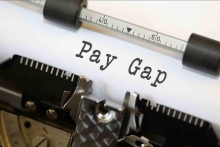Major gender pay gaps in the UK labour market

All firms with more than 250 employees in the UK are legally required to publish their gender pay gap. According to the BBC there is just three sectors that pay women more than men: the water and waste management sector, household services, and, perhaps surprisingly, mining.
In a recent statement PSI is demanding an end to gender-based discrimination at work and calling for the transformation of the division for labour:
Unequal pay remains one of the main indicators of unbalanced relations between men and women in the labour market, which is compounded by the gender-based division of labour. Wages are not merely an expression of value, but also imply concrete social structures. Differences based on class, gender and race divide workers, intensifying the pay gaps that feed an intricate system that seeks to exploit the vulnerable foremost.
Why is there a gender pay gap?
The Fawcett Society, a equality campaign group, say the gender pay gap reflects inequalities and discrimination in the labour market that mostly affects women. Women earn significantly less than men over their entire careers for complex, often interrelated reasons.
-
Differences in caring responsibilities
-
More women in low skilled and low paid work
-
Outright discrimination
Sweden: In front on gender equality?
Sweden has come a long way in making sure that women and men are treated equally in the workplace. Still, the numbers shows that they still have some gender gap challenges. Kommunal, a PSI affiliate, is Sweden’s largest trade union with more than 500,000 members, many of them women. Ludvig Lundstedt, a analytics from Kommunal, spoke to BBC World about the situation in Sweden:
One of the biggest issues are that the labour market is so gender segregated. We have sectors that are completely dominated by women. A lot of them are member of our union, such as assistant nurses and childcare workers. They earn a lot less than their male counterparts. If you compare an assistant nurse to a car mechanic, they have the same type of education, she only earnes 78 percent of the car mechanic in Sweden.
Trade union is using collective bargaining as a tool for equality
Sweden has greatly increased the economic equality between women and men over time. Still, a pay gap remains. Women’s average monthly salaries in Sweden are less than 87 percent of men’s – 95 per cent when differences in choice of profession and sector are taken into account.
From our sight we are doing a lot of different things. We trying to do different types of wage increases that are more beneficial to jobs that are dominated by women. In our last collective bargaining agreement we signed with the regions and municipalities, we had a specific wage increase for assistant nurses. So they had a higher rise than the rest of the labour market. In that way trying to close the gender gap in the long run.

